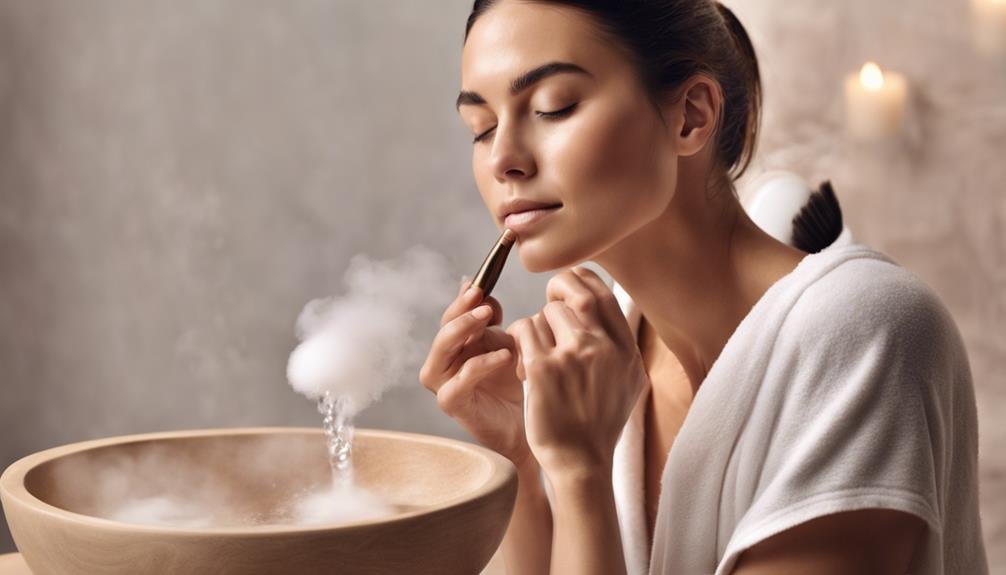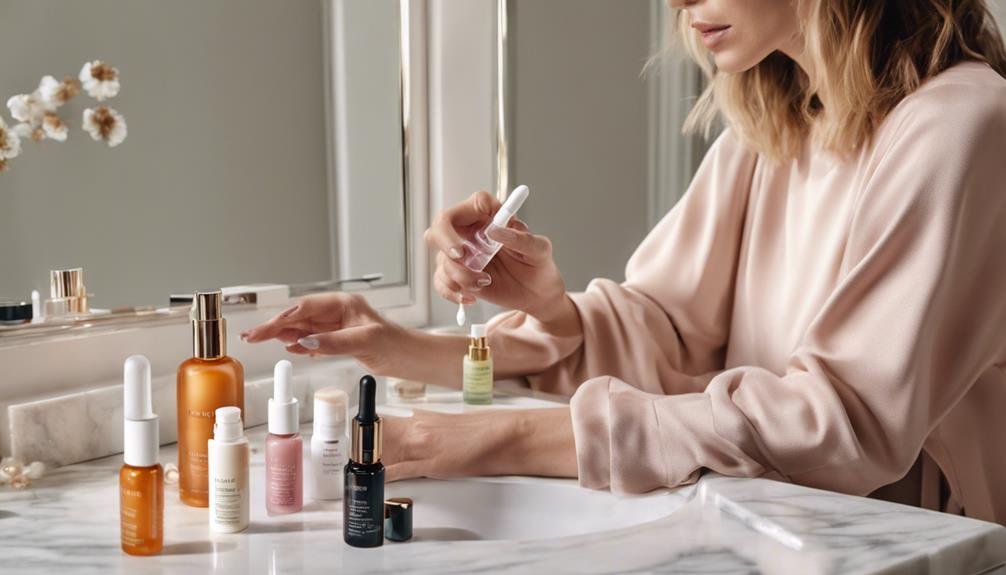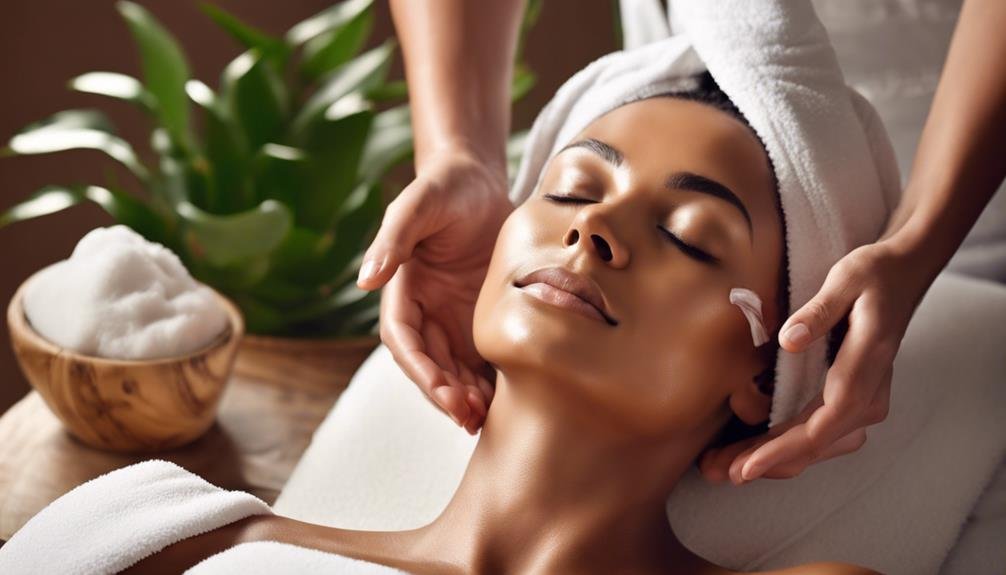To kickstart the journey towards rejuvenating your skin, imagine waking up to a refreshed and glowing complexion every day. The secret lies in establishing a consistent skincare routine that addresses your skin's specific needs. But what if there were other lesser-known factors that could significantly impact your skin's health and vitality? Let's explore some surprising techniques and habits that could revolutionize your approach to skincare, leading to a more youthful and radiant appearance.
Key Takeaways
- Implement a consistent skincare routine with cleansing, exfoliation, moisturizing, and sunscreen.
- Stay hydrated with water-rich foods, moisturizers, and adequate water intake.
- Manage stress levels through relaxation techniques and sufficient sleep.
- Incorporate regular exercise for improved blood flow and skin cell renewal.
- Consider professional skin treatments for specialized rejuvenation and guidance.
Skincare Basics
To achieve radiant and healthy skin, understanding the fundamentals of skincare is essential. Cleansing your face daily is the first step towards maintaining clear skin. Use a gentle cleanser suitable for your skin type to remove dirt, oil, and makeup that can clog pores and lead to breakouts.
Following cleansing, exfoliation is key to removing dead skin cells that can dull your complexion. Incorporating a weekly exfoliation routine can reveal smoother and brighter skin.
After cleansing and exfoliating, applying a moisturizer is crucial to keep your skin hydrated and supple. Choose a moisturizer that suits your skin type – whether dry, oily, or combination.
Sun protection is non-negotiable for healthy skin. Always apply a broad-spectrum sunscreen with at least SPF 30 daily to shield your skin from harmful UV rays.
Lastly, remember to remove makeup before bed to prevent clogged pores and potential skin irritations. By following these basic skincare steps consistently, you can lay a strong foundation for rejuvenating your skin.
Hydration Is Key
Maintaining optimal hydration levels is a cornerstone of a well-rounded skincare routine. Hydration is crucial for healthy, glowing skin. When your skin is well-hydrated, it appears plump, smooth, and vibrant. Dehydrated skin can lead to a dull complexion, fine lines, and even exacerbate skin conditions like acne.
To ensure your skin stays hydrated, incorporate a high-quality moisturizer into your daily routine. Look for products containing hyaluronic acid, glycerin, or ceramides, which are excellent at retaining moisture in the skin.
Aside from topical products, remember to hydrate from within by drinking an adequate amount of water daily. Water helps flush out toxins, keeping your skin clear and hydrated. Additionally, consider using a humidifier in your room, especially during dry seasons, to maintain optimal moisture levels in the air, which can benefit your skin.
Gentle Cleansing Techniques
Effective cleansing techniques are essential for maintaining healthy skin. When cleansing your face, opt for a gentle cleanser that suits your skin type. Avoid harsh products that can strip away natural oils and disrupt the skin's barrier. Use lukewarm water to wash your face, as hot water can be too drying. Gently massage the cleanser onto your skin using circular motions, focusing on areas prone to oiliness or dryness. Rinse thoroughly to ensure no residue is left behind.
Consider using a soft cloth or cleansing tool to aid in removing dirt and makeup without causing irritation. Pat your skin dry with a clean towel instead of rubbing, which can aggravate sensitive skin.
Aim to cleanse your face twice a day, in the morning and evening, to remove impurities that have accumulated throughout the day. By incorporating these gentle cleansing techniques into your skincare routine, you can maintain a healthy complexion and promote skin rejuvenation.
Exfoliate Regularly
Regular exfoliation plays a crucial role in promoting healthy and radiant skin. By gently removing dead skin cells that can clog pores and dull your complexion, exfoliation helps reveal a fresher, more youthful appearance. It also enhances the effectiveness of your skincare products by allowing them to penetrate deeper into the skin.
To exfoliate effectively, choose a method that suits your skin type. For sensitive skin, opt for chemical exfoliants like alpha hydroxy acids (AHAs) or beta hydroxy acids (BHAs). These ingredients work to dissolve dead skin cells without harsh physical scrubbing.
If you have oily or acne-prone skin, consider using a gentle scrub with small exfoliating particles to unclog pores and prevent breakouts.
Remember to exfoliate no more than 2-3 times a week to avoid over-exfoliation, which can damage the skin barrier. Always follow up with a hydrating moisturizer to replenish lost moisture and keep your skin balanced and healthy. By incorporating regular exfoliation into your skincare routine, you can achieve a smoother, brighter complexion.
Incorporate Serums
To further enhance the health and appearance of your skin, consider incorporating serums into your skincare routine. Serums are lightweight, fast-absorbing liquids that deliver a high concentration of active ingredients deep into the skin. These potent formulas are designed to target specific skin concerns such as hydration, brightening, anti-aging, or acne. When choosing a serum, look for ingredients like hyaluronic acid for moisture, vitamin C for brightening, retinol for anti-aging, or niacinamide for overall skin health.
Serums can be applied after cleansing and toning but before moisturizing. A small amount goes a long way, so a few drops are usually enough to cover your face and neck. Gently pat the serum into your skin and allow it to fully absorb before following up with a moisturizer.
Consistent use of serums can help improve the texture, tone, and overall radiance of your skin, making them a valuable addition to your skincare regimen.
Vitamin-Rich Diet
A diet rich in vitamins plays a crucial role in nourishing your skin from within and promoting a healthy complexion. Ensuring you consume a variety of essential nutrients can make a noticeable difference in the overall appearance and health of your skin.
Here are three key vitamins that can benefit your skin:
- Vitamin C: Known for its antioxidant properties, Vitamin C aids in collagen production, which helps maintain skin firmness and elasticity. It also helps in brightening the skin tone and protecting against damage from free radicals.
- Vitamin E: Another powerful antioxidant, Vitamin E protects the skin from sun damage and helps to retain moisture, leading to a more hydrated and youthful appearance.
- Vitamin A: Essential for skin repair and maintenance, Vitamin A supports cell turnover, helping to prevent clogged pores and promoting a smoother skin texture.
Incorporating these vitamins into your diet through fruits, vegetables, nuts, and seeds can enhance your skin's natural radiance and vitality.
Protect From Sun Damage
Nourishing your skin with a vitamin-rich diet is a significant step towards maintaining a healthy complexion. However, protecting your skin from sun damage is equally crucial in your skincare routine. The sun emits harmful UV rays that can lead to premature aging, dark spots, and even skin cancer.
To shield your skin, apply a broad-spectrum sunscreen with an SPF of 30 or higher every day, even on cloudy days. Reapply every two hours, especially if you're swimming or sweating. Wearing protective clothing like hats and sunglasses can also help minimize sun exposure. Seek shade during peak sun hours, typically between 10 a.m. and 4 p.m., when the sun's rays are strongest.
Remember that sun damage accumulates over time, so consistent protection is key to maintaining youthful and healthy skin. By incorporating sun protection into your daily skincare routine, you're taking a proactive step towards preserving your skin's natural beauty.
Stay Hydrated
Hydration plays a vital role in maintaining healthy skin. Ensuring that your skin is well-hydrated can improve its elasticity, reduce the appearance of fine lines, and give you a radiant complexion.
Here are three essential tips to help you stay hydrated and keep your skin looking its best:
- Drink an adequate amount of water: Aim to drink at least 8-10 glasses of water a day to keep your skin hydrated from the inside out. Water helps to flush out toxins from your body, leaving your skin looking clear and refreshed.
- Use a hydrating moisturizer: Choose a moisturizer that contains ingredients like hyaluronic acid or glycerin to lock in moisture and prevent water loss from your skin. Apply it daily, especially after showering or washing your face.
- Eat water-rich foods: Incorporate fruits and vegetables with high water content, such as watermelon, cucumbers, and oranges, into your diet. These foods not only provide hydration but also essential vitamins and minerals that promote healthy skin.
Stress Management
How does stress impact your skin health?
Stress can wreak havoc on your skin in a variety of ways. When you're stressed, your body releases cortisol, a hormone that can lead to increased oil production in your skin. This excess oil can clog pores and contribute to breakouts, acne, and other skin issues.
Additionally, stress can impair your skin's ability to retain moisture, leading to dryness, dullness, and a lackluster complexion. Furthermore, chronic stress can weaken your skin's barrier function, making it more susceptible to environmental damage and premature aging.
To manage stress and promote healthy skin, it's essential to incorporate stress-reducing activities into your daily routine. Practices such as mindfulness meditation, deep breathing exercises, yoga, and regular physical activity can help lower cortisol levels and improve overall skin health.
Taking time for self-care, setting boundaries, and seeking support from loved ones are also crucial in managing stress effectively. By prioritizing stress management, you can support your skin's natural rejuvenation process and achieve a healthy, glowing complexion.
Get Adequate Sleep
Adequate sleep plays a crucial role in maintaining healthy skin. When you prioritize restful nights, your skin reaps the benefits in more ways than one. Here's how getting enough sleep can help rejuvenate your skin:
- Promotes Skin Repair: During sleep, your body goes into repair mode, producing collagen that helps repair skin damage caused by UV rays and environmental pollutants. This process reduces the appearance of wrinkles and fine lines, giving your skin a more youthful look.
- Prevents Premature Aging: Lack of sleep can lead to increased cortisol levels, which break down collagen and elastin, the proteins that keep your skin firm and elastic. By consistently getting enough sleep, you can help prevent premature aging and maintain skin elasticity.
- Enhances Skin Radiance: Adequate sleep improves blood flow to the skin, giving you a natural glow. It also helps reduce inflammation, leading to a more even skin tone and a healthier complexion overall. Prioritizing quality sleep is a simple yet powerful way to rejuvenate your skin from the inside out.
Exercise for Healthy Skin
To maintain healthy skin, incorporating exercise into your routine is a beneficial practice. Exercise increases blood flow, which helps nourish skin cells and keep them healthy. When you work out, your heart rate increases, pumping more oxygen to your skin and carrying away waste products. This process can help rejuvenate your skin and give it a healthy glow.
Additionally, exercise helps reduce stress, which can have a significant impact on your skin's appearance. High levels of stress can lead to skin issues like acne and eczema, so by engaging in regular physical activity, you can help keep your stress levels in check and promote clearer skin.
Furthermore, exercise promotes better sleep, which is essential for skin rejuvenation. During deep sleep, the body's cell division and repair processes are at their peak, aiding in the regeneration of skin cells. By incorporating exercise into your routine, you aren't only benefiting your overall health but also contributing to the rejuvenation of your skin.
Regular Professional Treatments
For optimal skin health and rejuvenation, incorporating regular professional treatments into your skincare routine is essential. Professional treatments can address specific skin concerns effectively and provide a deeper level of care that may not be achievable with at-home remedies alone.
Here are three key reasons why integrating professional treatments can elevate your skincare regimen:
- Specialized Expertise: Skincare professionals have the knowledge and training to assess your skin's unique needs accurately. They can recommend personalized treatments tailored to target your concerns, whether it's acne, aging, hyperpigmentation, or overall skin texture.
- Advanced Technologies: Professional treatments often utilize state-of-the-art technologies that deliver results beyond what traditional home skincare tools can achieve. Procedures like laser therapy, chemical peels, microneedling, and microdermabrasion can help rejuvenate your skin and address stubborn issues effectively.
- Consistent Monitoring: With regular professional treatments, you benefit from ongoing monitoring of your skin's progress. Professionals can track improvements, adjust treatments as needed, and provide valuable guidance on maintaining healthy, radiant skin in the long run.
Frequently Asked Questions
Can Genetics Affect Skin Aging?
Genetics can indeed influence skin aging. Factors like collagen production, elasticity, and moisture retention are determined by your genes. Understanding these genetic predispositions can help tailor skincare routines to better address your unique needs.
How Does Pollution Impact Skin Health?
Pollution can accelerate skin aging by causing oxidative stress and inflammation. It can lead to dullness, wrinkles, and uneven skin tone. Protect your skin by cleansing regularly, using antioxidants, and applying sunscreen daily.
Is It Necessary to Change Skincare Products Seasonally?
Certainly! Switching skincare seasonally is sensible. Your skin's needs alter with climate changes. Select products with ingredients like hyaluronic acid for hydration in winter and lighter formulas with antioxidants for summer protection.
Can Certain Medications Affect Skin Appearance?
Certain medications can indeed impact your skin appearance. For instance, some medications may cause dryness, sensitivity, or acne flare-ups. It's essential to consult with your healthcare provider to address any skin concerns related to your medications.
What Role Does Alcohol Consumption Play in Skin Aging?
Drinking alcohol speeds up skin aging by dehydrating your skin, dilating blood vessels, and reducing collagen production. This can lead to wrinkles, dullness, and sagging skin. Limiting alcohol intake can help preserve your skin's youthful appearance.
Conclusion
Incorporating regular exfoliation into your skincare routine can significantly improve skin texture and promote cell turnover. Studies have shown that exfoliating 1-2 times a week can help reduce the appearance of fine lines and wrinkles, resulting in a smoother and more youthful complexion. Remember to choose a gentle exfoliant suitable for your skin type to avoid irritation and achieve optimal results. Start exfoliating today for healthier, rejuvenated skin!







